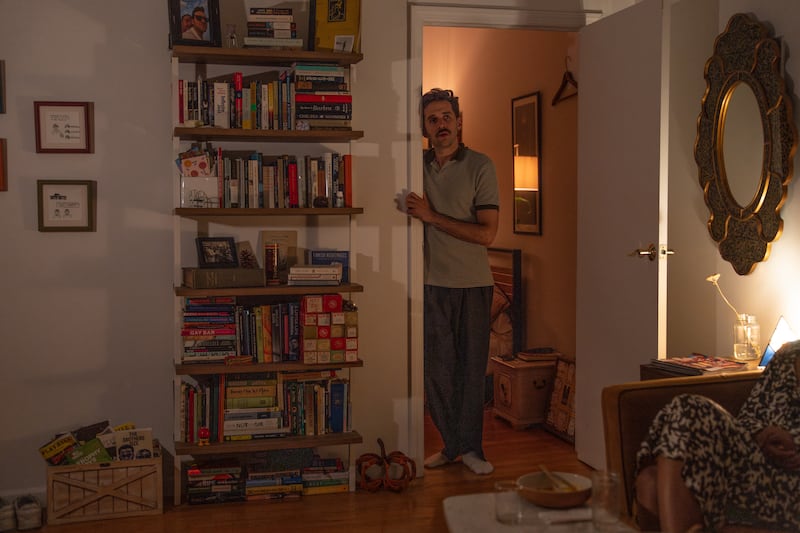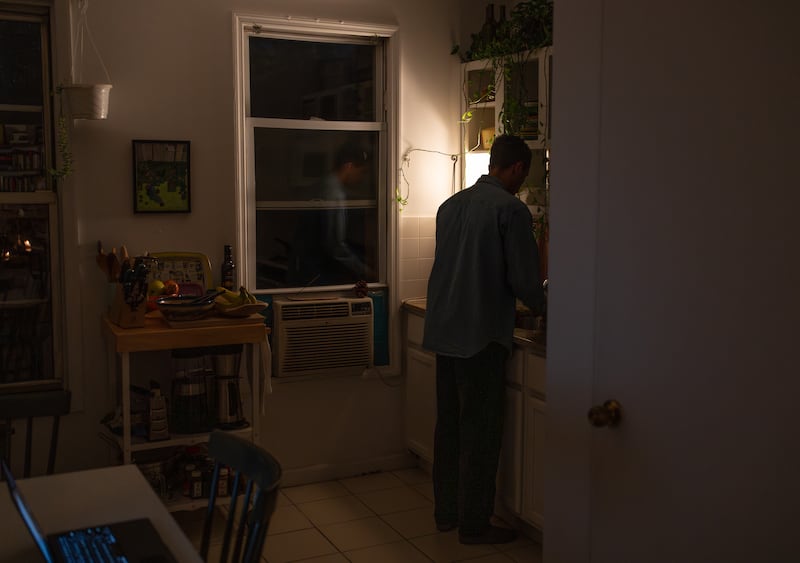It’s oddly appropriate that squiring a ticket to see Slanted Floors has become as tough as booking a table at one of New York’s hottest restaurants.
For one, every performance hosts only six audience members, and so there is a waitlist. For another, at what is currently New York’s most unique and exclusive piece of theater, you can expect food (delicious vegetarian soup and bread) and to eat this light repast with the two actors playing a couple also eating their supper.
The setting couldn’t be more site-specific: you are not in a theater but the living room of a Greenpoint walk-up apartment watching the couple play out their relationship inches from you.
Slanted Floors, created by Billy McEntee and directed by Ryan Dobrin, begins with you first lurking outside the front door of an apartment building. There, production stage manager Damayanti Wallace meets you to take you upstairs. You are assigned a chair in the living room. For 70 minutes you sit in that chair (no bathroom breaks), and watch a slice of domesticity unfold in front of you.

McEntee and Dobrin have invited small audiences into nervily intimate spaces before; last year, The Voices in Your Head, staged in a Brooklyn storefront, imagined a turbulent night at a support group meeting.
It is the micro-ordinariness of Slanted Floors that is striking; you are observing perhaps a scene not unlike your own daily life (or elements of it, single or coupled). Habits, silences, intimacies, quiet, the turning on of taps and showers, the going to the bathroom, the serving of food, the washing of dishes, the telling of stories, the making of plans, sundry conversation, the using and wasting of time—Slanted Floors isn’t high on drama, but it shows the power of evoking the ordinary to unpeel something profound.
The flat is the home of two arts-involved guys, freelancer Kaplan (Adam Chanler-Berat) and his partner Teddy (Kyle Beltran), and when the play opens we first meet Kaplan, whose screensaver is a picture of RuPaul with the legend, “Freelance For Your Life.”
We see him kind of work, kind of not-work, head down internet rabbit holes, make plans, search theater-world gossip, halfheartedly do yoga, and play with marbles whose progress across the floor gives the play its surface-level title.
When Teddy arrives home from work, we see in close-up the easy intimacy of the men’s relationship. Showers are had, clothes are changed, soup heated up and—as well as serving themselves—we are served too (the food, made fresh for each performance, is by Jess Tsang). We eat together, but with no fourth walls broken. Kaplan and Teddy small-talk through theater gossip, the nearby Radio Bakery’s pistachio croissants, and gift-giving around an imminent wedding.
This is an intriguing form of theatre verité, where in the course of nothing much happening we see the full contours of a relationship, the melding of two personalities, love, intimacy, irritation, dreams, ambition, boredom, frustration—the everyday big and small of coupled life.
There is no interaction between Chanler-Berat and Beltran and the audience in this compact space; they do not acknowledge us. Dobrin’s precise direction makes Slanted Floors feel bracingly natural. Throughout the 70 minutes, Nick Auer’s lighting—which begins as regular apartment lighting and steadily becomes more theatrical—changes by hands unseen.
The heart of the piece is Teddy’s imagining of a new drama he has dreamed up—the story of a group of people living off the grid in a commune, and what might happen on the day of a semi-regular break when the residents are allowed to go into the real world.

Here, while the fourth wall isn’t broken, Teddy points to each of the six audience members as he relates to Kaplan the characters he has dreamt up. Kaplan wonders if this imagined utopia is what Teddy wants for himself; it is also a mirroring of what Slanted Floors is: a play or drama that imagines how we live and might live.
At the end of Teddy’s scene-setting, Kaplan cannot hide how underwhelmed he feels about it. And so we follow the silences—not terrible, but something feeling askew—until the men wash and tidy up and then retire to bed, with magazines being read, Teddy asking the question on our minds—did Kaplan really hate the idea?—and the glow of cell-phones being checked before lights out.
Up close and this personal, Slanted Floors feels revelatory in a way conventional theater, with its distancing and distractions, does not. On the way to the subway, you may marvel at this clever rendering of two people conducting the daily business of sharing a life yet retaining their own individual selves, about what is shared and what stays private—and about that delicious soup and bread.
The post Inside New York’s Most Exclusive Theater Show appeared first on The Daily Beast.




